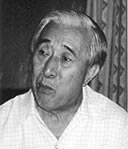
Gyalo Thondup, the elder brother of His Holiness the Dalai Lama
In an interview to Radio Free Asia’s Tibetan service (broadcast in parts beginning July 17, 2003), Thondup, whose meeting with Chinese leader Deng Xiaoping in 1979 began a series of contacts between Tibetans and the Chinese leadership, said the visit of the Dalai Lama’s envoys helped re-establish contact and to fill a gap.
Asked why the Chinese side has publicly failed to acknowledge that they are dealing formally with envoys of the Dalai Lama, Thondup responded saying their public stance on this is not of much importance. The work will need to be done in stages, step by step, he said.
Thondup said the Tibetan problem could be solved only through face-to-face meeting with Chinese leaders. He said at his personal level he has been volunteering his service since 1952 to find a solution to the Tibetan problem. Asked why he changed his approach in 1979 from leading a resistance movement launched at his initiative to engaging with the Chinese, Thondup said his experience showed that neither India nor the United States would solve the Tibetan problem. He realized that it is only through talks with the Chinese side that progress can be made.
Thondup supported Dharamsala’s initiative at confidence building. He felt, however, that it should be a two-way street and said that Chinese leaders could do more to make progress on the Tibetan issue. He said he had criticized the Chinese side for banning the Tibetans from holding incense-burning ceremony on the birthday of His Holiness the Dalai Lama. He said that this is a religious ritual and, as such, the Chinese should allow it. Thondup blamed local leaders in Lhasa, Amdo and elsewhere saying that senior leaders may not be aware of this distinction.
He said that during his meetings with the Chinese leaders in 1992 he told them that he was thinking of abandoning his efforts to find a solution because he did not see any movement on the Chinese side. The Chinese side asked him not to do this and said that it takes time and effort to kick a ball through the goal post.
When Thondup was in Hong Kong he received a phone call saying a message would be waiting for him at the Chinese Embassy in New Delhi. When he returned to India from that trip (accompanied by Sonam Topgyal, a former chairman of the Tibetan Cabinet), he was informed by the Chinese Ambassador in New Delhi that Dharamsala should think of moving the Tibetan Government-in-Exile to Lhasa to strengthen the government of the Tibet Autonomous Region.
Thondup said this message was conveyed to the Tibetan leadership in Dharamsala who wanted reconfirmation. When Thondup contacted the Chinese Ambassador on this, his position had changed and the Ambassador said that was only his personal view.
Asked about Dharamsala’s announcement that there was just one channel of contact between the Tibetans and the Chinese leadership, Thondup said his efforts were at the personal level, but the issue that he took up was not personal and concerned Tibet.
Thondup said China has changed much in the past 10 years and that he was hopeful for the young leaders who have assumed office in China. He also urged Tibetans to have an indepth understanding of China.

